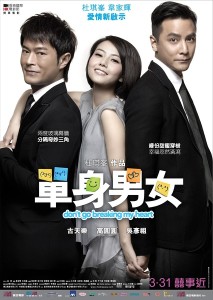Don’t Go Breaking My Heart
单身男女
Hong Kong/China, 2011, colour, 2.35:1, 115 mins.
Director: Du Qifeng 杜琪峰 [Johnnie To].
Rating: 6/10.
An entertaining but shallow rom-com from Hong Kong director Du Qifeng [Johnnie To] that doesn’t really engage the emotions.
Hong Kong, autumn 2008, just prior to the international banking crisis. On a bus to work, investment bank analyst Cheng Zixin (Gao Yuanyuan) bumps into her former boyfriend Owen (Yin Ziwei), with whom she’d lived for seven years and had come to Hong Kong from China. Owen is with his heavily pregnant wife (Li Shiyun), who freaks out and forces Cheng Zixin to leave the bus. Driving alongside, investment bank CEO Zhang Shenran (Gu Tianle) observes the whole scene, as well as Cheng Zixin subsequently being saved by raggedy alcoholic Fang Qihong (Wu Yanzu) from being run down in the street. Zhang Shenran’s office is opposite Cheng Zixin’s, and the pair start a remote friendship  signalling to each other through their windows. Meanwhile, Cheng Zixin later bumps into Fang Qihong, who turns out to be a top architect who’s on the skids, and the two also become friends. She urges him to stop drinking and get back to work, and they agree to meet in a week’s time. Cheng Zixin forgets the appointment when Zhang Shenran invites her out for a drink the same evening, but also finds herself stood up when he casually beds a western woman, Angelina (Larisa Bakurova), who works in the office above Cheng Zixin’s. Next day, Cheng Zixin bawls him out, and that evening the news of US investment bank Lehman Brothers filing for bankruptcy ruins Zhang Shenran’s business. Three years later, Zhang Shenran suddenly reappears in Cheng Zixin’s life as Asia-Pacific CEO of the bank she works for. He starts a major charm offensive to win her back but she turns down his marriage proposal as he can’t promise always to be faithful. When a reformed and successful Fang Qihong turns up again in Cheng Zixin’s life, Zhang Shenran realises he has a serious competitor.
signalling to each other through their windows. Meanwhile, Cheng Zixin later bumps into Fang Qihong, who turns out to be a top architect who’s on the skids, and the two also become friends. She urges him to stop drinking and get back to work, and they agree to meet in a week’s time. Cheng Zixin forgets the appointment when Zhang Shenran invites her out for a drink the same evening, but also finds herself stood up when he casually beds a western woman, Angelina (Larisa Bakurova), who works in the office above Cheng Zixin’s. Next day, Cheng Zixin bawls him out, and that evening the news of US investment bank Lehman Brothers filing for bankruptcy ruins Zhang Shenran’s business. Three years later, Zhang Shenran suddenly reappears in Cheng Zixin’s life as Asia-Pacific CEO of the bank she works for. He starts a major charm offensive to win her back but she turns down his marriage proposal as he can’t promise always to be faithful. When a reformed and successful Fang Qihong turns up again in Cheng Zixin’s life, Zhang Shenran realises he has a serious competitor.
REVIEW
After almost two years purely producing, Hong Kong’s Du Qifeng 杜琪峰 [Johnnie To] returns to the directing chair with Don’t Go Breaking My Heart 单身男女, his first movie since gangster tale Vengeance 复仇 (2009) and his first rom-com since Yesterday Once More 龙凤斗 (2004). Despite smooth direction which makes the film painless to watch, and a charming performance by Mainland actress Gao Yuanyuan 高圆圆 – as a woman who can’t decide between a charming fox (Gu Tianle 古天乐 [Louis Koo]) and a nice lamb (Wu Yanzu 吴彦祖 [Daniel Wu]) – it’s at least a notch below Du’s best rom-coms, with none of the emotional undertow of Yesterday (with its great chemistry between Liu Dehua 刘德华 [Andy Lau] and Zheng Xiuwen 郑秀文 [Sammi Cheng]) or the clever plot-twists of the Taiwan-set Turn Left, Turn Right 向左走•向右走 (2003).
This being one of To’s collaborations with his Milkyway Image partner Wei Jiahui 韦家辉 [Wai Ka-fai], the movie comes equipped with a typically Wei-like high concept: the threesome signalling to each other through office windows with loving signs and written messages, which (along with camera-phones) often convey more emotion than when the principles meet face to face. (In this respect, the film seems like a feature-length development of Australian director Patrick Hughes’ short, Signs, which attained legendary internet status in 2008.) The script, by Wei and three others, comes up with at least one neat comic variation when the signage by Gu’s character is also read by another woman in the same building as Gao’s character; but the idea isn’t followed through in any meaningful rom-com way, and the movie basically becomes a cliff-hanger of Gao’s character not being able to decide between two men in her life. In the second half this involves flitting back and forth between Hong Kong and Gao’s hometown of Suzhou, China, as if the two places are next door to each other – forcing a Mainland element into the film for box-office reasons rather than anything else.
Though she’s better known for serious roles (Shanghai Dreams 青红, 2005; Driverless 无人驾驶, 2010), Gao can certainly do lighter romance, as she memorably showed in the South Korea/China co-production A Good Rain Knows 호우시절 | 好雨时节 (2009), and in Heart her very different, Mainland style of acting plays off in a fresh way against Gu and Wu’s typically slick, Hong Kong performances. The basic problem with the film is that, even on a rom-com level, the film is seriously shallow: the audience observes her emotional indecision but feels nothing for her (let alone the two men), which weakens the force of both the love triangle and the cliff-hanger finale. When she does make her choice, the loser simply shrugs and waves goodbye – much like the audience.
Supporting performances are okay – apart from a bizarre characterisation by Liu Yuhong 刘玉红 as Gao’s grandmother and a frantic one by Du regular Lin Xue 林雪 [Lam Suet] – but the movie is essentially a threesome, with no developed smaller roles. Technically, the film is a smooth rather than glossy ride, with some its best moments being wordless sequences in which the visuals and music carry the story. But there’s an insistent feeling of Du going through the motions in this one rather than investing any real feeling.
The original Chinese title literally means “Single Men and Women”.
CREDITS
Presented by Media Asia Films (HK), China Film Media Asia Audio Video Distribution (CN). Produced by Milkway Image (HK).
Script: Wei Jiahui [Wai Ka-fai], You Naihai, Chen Weibin, Ou Wenjie. Photography: Zheng Zhaoqiang [Cheng Siu-keung]. Editors: David Richardson, Liang Zhanlun. Music: Xavier Jamaux. Production design: Yu Jia’an [Bruce Yu]. Art direction: Chen Jinhe [Raymond Chan], Li Qingyu. Costume design: Huang Jiabao. Sound: Chen Weixiong, Mai Zhi’an, Martin Chappell. Visual effects: Luo Weihao (Different Digital Design).
Cast: Gu Tianle [Louis Koo] (Zhang Shenran), Wu Yanzu [Daniel Wu] (Fang Qihong), Gao Yuanyuan (Cheng Zixin), Lin Xue [Lam Suet] (John, Cheng Zixin’s boss), Yin Ziwei [Terence Yin] (Owen, Cheng Zixin’s former boyfriend), Li Shiyun (Owen’s wife), Jia Xiaochen (Joyce), Larisa Bakurova (Angelina), Luo Yongxian (Lucy), Liu Yuhong (Cheng Zixin’s grandmother), Yan Jingyao (Cheng Zixin’s mother), Wang Zhihua (Fang Qihong’s father), Du Yachun (Fang Qihong’s mother), Gu Tianxiang, Ou Xuanwei, Zeng Jianyi, Chen Shiliang, Feng Boran (Cheng Zixin’s work colleagues), Liang Tianchi, Chen Yali, Zeng Haolan (Fang Qihong’s work colleagues), Mark Alan Loynd (fat westerner), Ma Zhuoning (Zhang Shenran’s secretary), Li Weixuan, Chen Songxin, Wang Bei’er (Zhang Shenran’s work colleagues), Leon Hill (CCBV newscaster), Zhou Jiasheng (car salesman), He Rihua (restaurant manager), He Shumei, Ma Yingmin, Huang Ying (sexy women), Li Derong (hairdresser), Qin Nan (real estate salesman).
Premiere: Osaka Asian Film Festival (Special Screenings), 10 Mar 2011.
Release: Hong Kong, 31 Mar 2011; China, 31 Mar 2011.
(Review originally published on Film Business Asia, 25 Mar 2011.)
